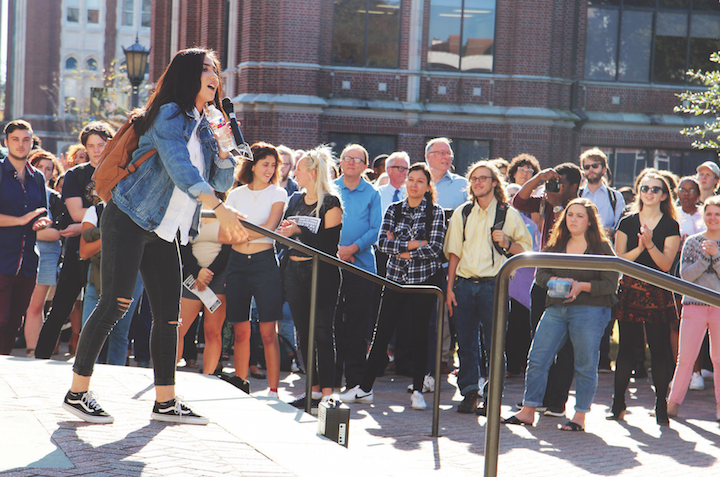University declares Loyola not an official Sanctuary Campus
Melissa Alba, political science junior, talks to a crowd outside Monroe Library about her experiences as a Hispanic-American in the U.S. during a campus walkout Nov. 16. At the walkout, students declared Loyola a sanctuary campus, but no official statement has been made by Loyola administration.
December 9, 2016
Margie, a 16-year-old student at John Ehert High School in Marrero, Louisiana, immigrated with her parents to the United States from El Salvador when she was only five. She now has two siblings who were born in the U.S. Today, her family is one of many immigrant families who have growing concerns since the presidential election of Donald Trump.
“Since the election, my past violent experiences have come back,” Margie said.
Margie works with Alvaro Alcazar, interdisciplinary faculty member at Loyola and director of the university’s Twomey Center for Peace Through Justice. On Saturdays, Margie participates in Alcazar’s Pre-College Incubation Experience for Majoring in Math and the Natural Sciences, a program Alcazar said is designed to encourage and empower public high-school students from low-income, immigrant families.
Alcazar’s mission for the program is driven by his own experiences as a victim of torture and oppression in his home country of the Philippines.
“This is my way of saying thank you to this nation,” he said. “It was a place of security and safety that welcomed me when I was feeling rejected and threatened in my own home.”
Since the start of Alcazar’s work with high-school students, three participants in his program—all children of immigrants—have attended Loyola. Today, one student now teaches in France, another has just been hired at an accounting firm and the third is currently enrolled in law school. According to Alcazar, these accomplished students have served as mentors and volunteer tutors over the years, inspiring Margie and others in his program.
“My parents would love for me to attend Loyola once I graduate and they are committed to this plan—loans or not,” Margie said.
Margie’s hopes of attending college may depend on the future of immigration legislation, such as the Deferred Action for Childhood Arrivals policy, implemented in 2012, which protects qualified immigrants who arrived in the U.S. before age 16 from deportation.
Loyola’s president, the Rev. Kevin Wildes, S.J., sent an email to the university community Nov. 30 saying Loyola will stand with and protect its undocumented students and students of all backgrounds. Wildes was one of over 70 Catholic university officials to sign a statement of solidarity released by the Association of Catholic Colleges and Universities that same day. The statement mentioned the deferred action policy as a protection measure for undocumented students, a policy which President-elect Donald Trump’s transition team has used as an example of executive overreach on immigration legislation that Trump has vowed to rescind.
This statement signed by leaders in Catholic education was released two weeks after Loyola students and faculty held a solidarity walkout Nov. 16, at which university community members spoke of unity and social justice and marched around campus shouting anti-hate chants. Loyola was among 80 college campuses across the nation to react that day to the push to unite and stand up for Muslims, people of color, LGBT individuals, women and all other minorities who feel targeted since the presidential election.
Students and faculty who organized the walkout declared Loyola to be a Sanctuary Campus, but the university took no official stance.
Ashley Howard, assistant professor of history and director of African-American studies, was among faculty who spoke at the walkout and declared Loyola a safe space.
“If you find yourself as a historically marginalized person—as someone who identifies as gay or black or Muslim or a woman—this is a safe space for you,” Howard said. “This is your university. We are here for you.”
In Wildes’ email, he said, “Loyola will work to protect to the fullest extent of the law undocumented students and promote retention of the Deferred Action for Childhood Arrivals Program.”
Wildes did not, however, declare Loyola to be an official sanctuary campus, a term that varies in meaning at college campuses throughout the country, according to a Dec. 3 article in The Washington Post about university’s exploration of “sanctuary status.”
According to The Post, for example, to some schools like the University of Pennsylvania—Trump’s alma mater—sanctuary status means refusing to allow federal agents to remove undocumented students from campus without a warrant. Many schools are still refusing to classify themselves as Sanctuary Campuses in fear of jeopardizing federal funding.
Similar to Wildes’ solidarity statement, Alcazar believes Loyola’s walkout and declaration were mostly symbolic.
“We will protect marginalized groups who are here at Loyola, but I do not think that it is to the extent that we would defy and prevent agents of the federal government from coming and saying ‘we need to deport you,’” Alcazar said. “That is the sad part.”
Margie said her family paid around $15,000 in legal fees for her to apply to the federal deferred action program. She hopes when she is a high school senior she will be eligible for financial aid through permanent residence status and may apply to Loyola, but if the federal deferred action policy is revoked, Margie and other undocumented students like her may find themselves facing a future without college in the U.S.
Margie’s parents have hired a lawyer to aid them in obtaining citizenship for their children. Once she is 18, Margie may be able to petition for her parents’ legal status as well, but until then because her parents have no documents, Margie said they are fearful.
Alcazar said two options exist for immigrant families in similar situations to that of Margie’s: break the law or break up the family.







